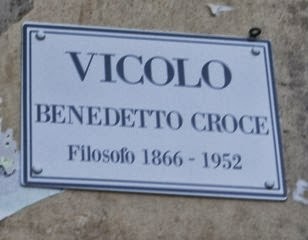I don't hear the term "fusion cooking" much any more but then, I do live in a place where most people just do not want to try food from other lands! I, however, still sometimes hanker after strong spices and, on those occasions, a smidgin of cinnamon or red chilli pepper will not do.
A few weeks ago, I made up this recipe for poached chicken - a neglected way of cooking one, I feel. It is a popular way of cooking chicken breasts but you can also cook a whole chicken by this method. The Sicilian ingredients are cinnamon and red chilli pepper in decent amounts and the lemon. If you add carrots, they could be sweet, Sicilian ones.
OK, now the size of the chicken you use will depend on the size of the largest pot you've got with a lid. Because I have a couple of large but not enormous pots, I only poach a whole chicken when I can get a small one, which is difficult in Sicily, though not in the UK. You need a pot that will take your chicken, plus a few vegetables and spices, comfortably and in which there is room to cover the chicken with liquid plus one inch.
Having selected your pot and got your chicken, season the inside of the chicken with coarse seasalt and a few twists of mixed peppercorns. Add half a lemon., half a red onion, 1 unpeeled garlic clove, 2 fresh bay leaves, a little dried oregano and knob of peeled, fresh ginger. Close the opening with a wooden skewer or some cocktail sticks.
Put the chicken in the pot and cover with water and 125 ml white wine. Season the liquid and add 2 more knobs peeled, fresh ginger, 2 dried chilli peppers, 1 unpeeled garlic clove, the other halves of the lemon and red onion, 1 large cinnamon stick [we get whackingly fat cinnamon sticks here] and a few fresh sage leaves. You can add a few unpeeled, sliced potatoes if you like - in my case it was a matter of how many I could cram in - and some sliced carrots if you wish. [I forgot these this time.]
Put the pot on the heat, bring to the boil, then put the lid on and lower the heat. Simmer for 50 mins., then turn the heat off and just leave everything for 10 mins.
The chicken will be so tender that it will be falling off the bone.
Last night I invented a rather jolly rice salad to go with this dish. Sicilians would be really puzzled by this as they seem to have difficulty in imagining a rice salad that does not contain tuna. [I can't eat fish and in restaurants, even when I ask if it's possible to have a rice salad without it, they will say, "Yes" but still bring me a portion with tuna, as if it's not fish at all. I've given up.] For this rice salad, apart from the pineapple, an ingredient which I had planned, I used what I happened to have and it was much more successful than I expected:
Cook 500 gr rice suitable for salads according to the instructions on the pack. Drain and rinse several times in cold water. Transfer to a large serving bowl. Add the slices of a whole, fresh pineaapple, a chopped red onion, a few chopped aubergines that have been preserved in oil, some fresh basil leaves and some sundried cherry tomatoes over which you have sprinkled a little oil. Put the mixture in the fridge until you are ready to serve.
Make up a dressing of 6 tablesp olive oil, 1 tablesp red wine vinegar, 1 tablesp honey, a little dried oregano and a seasoning of a couple of twists of mixed peppercorns and fine seasalt. Mix all together and put the bowl in the fridge till you are ready to serve the salad. Then chuck the dressing over and toss with a spoon and fork.
You can either serve the carved chicken - it won't need much carving! - with the potatoes and some of the cooking liquid and serve the rice salad separately or you can serve the slices of chicken on the salad with the potatoes around them. I prefer to do the latter.
I've also seved this with
this black rice salad [and I remembered the carrots that time!] but I think I prefer yesterday's white rice version.
























.jpg)


.jpg)
























